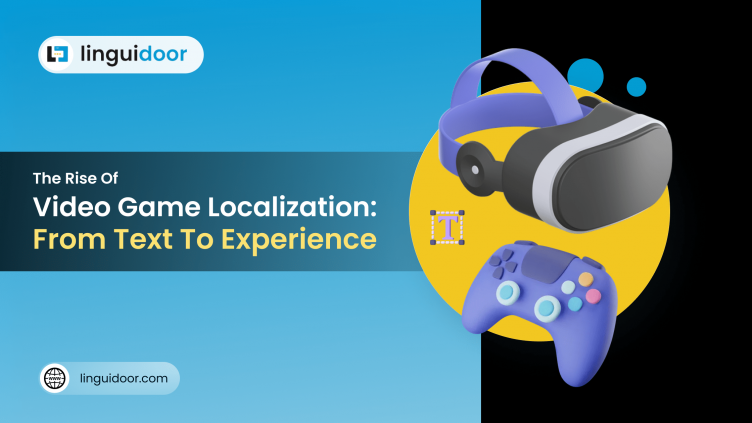The Rise of Video Game Localization: From Text to Experience

Video games have become much more than a source of entertainment in 2024. With the number of gamers worldwide surpassing 3.22 billion, this industry is set to reach new heights. Have you ever wondered though, what if gamers couldn’t understand the voice of the game? What if the characters, dialogues, or cultural references that we come across are difficult or impossible to understand? The answer is simple, bad user experience.
Video game localization has therefore much significance in the current gaming industry. Let us understand what exactly a wall of language barrier is and then understand the growth of video game localization and its influence on the gaming industry. We will also review a case study and discover how a video game localization agency can help overcome hurdles.
Wall of Language Barrier in Video Games
One of the biggest problems of developing a video game is to make it a game that is interesting all around the world. Nevertheless, language represents a barricade that stops many players from experiencing the game in the manner the developers initially designed it. Language is not only a medium of communication, but it is also a repository of culture, values, and identity. If a game is not localized properly, it might lead to a loss of meaning, context, and immersion for the players.
These are the barriers that video game localization tries to overcome. Localization of video games means however changing the game into the language and culture of the target market and in such a way creating a smooth and engaging experience for players anywhere in the world. Video game localization is not just a matter of translating words, but of conveying the essence and spirit of the game.
Rise of the Global Gaming Market
The demand for video game localization has increased significantly in recent years, due to the rapid growth and diversification of the global gaming market. As per a report, the global games market was worth $187.7 billion in 2023 and is expected to grow at a compounded annual growth rate of 9.4%.

As the world gaming market continues to grow multi-fold and diversify, the ability to meet the different demands for linguistic and cultural preferences has become crucial. The transition of the industry from being a regional thing to a global phenomenon shows the significance of localization in video games.
Power of Localization
The localization of video games is not only important but also the chance for the gaming industry to create more immersive and pleasing user experiences. It does the job of storytelling, accessibility, and reach and so, ultimately, gamers worldwide get a more enriched experience. Some benefits of video game localization include:
- Enhancing Storytelling and Immersion: Localization allows narratives to be complex and realistic as characters, dialogues, and settings will be able to be relatable to players from all around the world.
- Increasing Accessibility and Usability: Localisation guarantees that games are user-friendly and easy to comprehend, which lowers the entrance barriers for the players.
- Expanding Reach and Influence: Through the multi-pronged approach of localization, the game is seen more often by a wider range of people which gives it a greater edge in the global marketplace.
Evolution of Localization
Over the past decades, the process of video game localization has changed significantly from a simple translation of the game to a complex adaptation of the game for various languages and cultures. This evolution is evident in:
- From Text to Experience: The localization now focuses on conveying the linguistic, emotional, and cultural contexts rather than just translating words, so as to make engagement with the target audience more enjoyable.
- From Localization to Transcreation: The localization process gets more creative to some extent as it modifies and enriches the games to meet the needs of the local audience, thus facilitating relevance and acceptance.
- From Outsourcing to In-House: Localization has been moved from the field of externalization to a process of integration, which provides more flexibility to the gaming industry and higher degree of innovation.
Case Study- The Witcher 3: Wild Hunt

The Witcher 3: Wild Hunt, developed by CD Projekt Red, stands as a testament to the transformative power of meticulous localization. Originally developed in Polish, the game’s intricate narrative, complex characters, and rich world-building demanded a nuanced and culturally sensitive approach to localization.
CD Projekt Red cooperated with an expert linguistic team and professional cultural consultants who not only translated but also went a step further. They meticulously adapted the game’s text, audio, and visuals for various regions, ensuring:
| Aspect | Localization Efforts |
|---|---|
| Culturally-relevant humor | Jokes and puns were adapted to be relatable for the local audiences while maintaining their original purpose. |
| Accurate voice acting | The selection of voice actors was very critical, as it involved the consideration of their cultural understanding and their skill to give the right performance in the languages that the target audience spoke. |
| Localized cultural references | Place names were replaced by those that could represent the culture at each location. This made it easier for everyone, regardless of where they came from, to feel a part of the story. |

This commitment to excellence in localization was a key factor that was responsible for the game’s worldwide recognition. The Witcher 3 came out with a lot of critical acclaim and sales shot up, keeping players around the world interested with its impressive open world and interesting storyline.
Future of Localization

The games industry is ever-changing, and therefore localization methods of this industry will be constantly evolving as well. With the growing presence of the industry in new markets with various native languages and cultural patterns, localization practices will have to be developed to address the new situation. The future holds exciting possibilities:
- Reaching new audiences: Game translations are expected to expand into more languages, and that includes targeting emerging markets in Africa, the Middle East, and Southeast Asia. It is not easy to tackle this issue which includes difficulties of complex structures of languages and various kinds of writing systems.
- Adapting to diverse formats: Localization will have to adapt to the different genres and platform styles, from casual mobile games to VR experiences. Being relevant to the recent tech innovations like cloud gaming and AI is going to be a must.
- Elevating quality standards: While the localization industry is getting mature, people expect higher quality localizations. Implementing the existing best practices and adopting new assessment tools will be essential to offer a world-class experience for a global target.
Impact on the Gaming Industry
Video game localization is one of the most important factors contributing to the development of the gaming industry, as it promotes the growth of the industry and the happiness and loyalty of the players when it is done well. Video game localization service providers like Linguidoor can benefit the gaming industry in the following ways:
- Financial Boost: Data demonstrates that the level of sales and ROI can rapidly grow when games are localized, especially in those countries that are still emerging in Europe and Japan. It is all about more money and profit for the developers and publishers.
- Enhanced Reputation: By making use of localization, the brand perception can be enhanced as it gives culturally relevant experiences to the players that they can relate to. These customers are loyal to the brand, which results in positive word-of-mouth and returning to the business.
- Cultural Bridge: The game opens up the players to different languages and cultures. Thus, familiarity with foreign cultures is created and this leads to the emergence of inclusivity in the gaming community.
In summary, video game localization is considered one of the most important elements in the gaming industry of tomorrow as it enables more and more people to enjoy playing and, thus, fosters a more diverse and inclusive environment.
Conclusion
Video game localization is, therefore, not only a technical requirement but a transformative phenomenon that makes the gaming experience far more enjoyable for players across the globe. To smash the language barriers and enlarge the cultural circles, localization is of utmost importance to energize the gaming industry and bring inclusivity. With the help of professionals like Linguidoor, developers can overcome the difficulties of localization and increase their games’ potential on a global scale. The decision in the end has always been dependent on one’s needs. Therefore, do your homework, evaluate a variety of alternatives, and then take the right path on video game localization services.
FAQs
1. What is video game localization?
Translation of text and audio, adjusting graphics and gameplay, and keeping cultural relevance and sensitivity so that gamers from different countries have smooth gameplay are all part of the video game localization process.
2. How does video game localization help software developers?
Video game localization allows developers to get a bigger market, increase their sales and revenue, improve the brand reputation, and get players loyal and engaged.
3. What can Linguidoor do to facilitate video game localization?
Linguidoor provides services for the localization of games and thus bridges language gaps, increases the level of accessibility, and makes sure that the values and beliefs of gamers around the world are respected.

Made up your mind yet?
Empower your globalization goals today!




